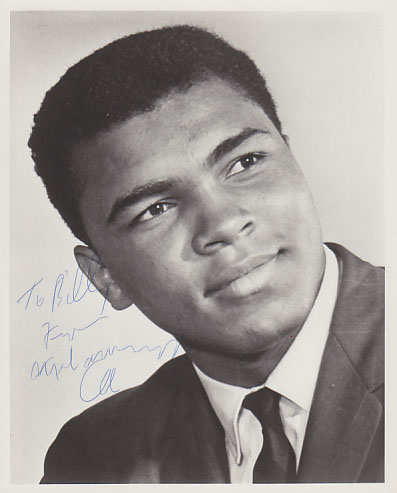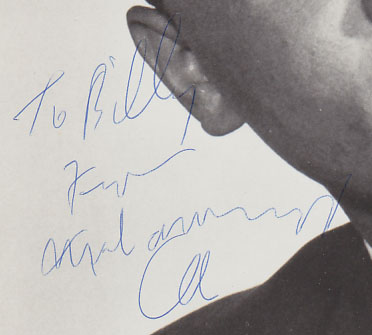
Muhammad Ali
Light Heavyweight Olympic Gold Medalist 1960
World Heavyweight Champion
1964-1967, 1974-1978, 1978-1979
|
|
CASSIUS MARCELLUS CLAY JR.
b: January 17, 1942
Louisville, Kentucky
|
World heavyweight champion Muhammad Ali has boldly signed and inscribed this vintage photograph in blue ballpoint ink... Signed just a few days prior to Ali's fight with Ernie Terrell in 1967 at the Houston Astrodome and just a few months prior to having his title stripped for refusing induction into the U.S. Armed Forces... The original obtainer has made a note on a separate piece of paper when and where he received the signature... Originally came in a folder frame with another Ali photograph, also being offered, both of which were signed at the same time
measures: 8 x 10"
condition: well preserved/excellent
$575
$18 insured shipping
 |
|
Muhammad Ali:
What's My Name? On February 6, 1967, Ali returned to a Houston boxing ring to fight Terrell in what became one of the uglier fights in boxing. Terrell had angered Ali by calling him Clay, and the champion vowed to punish him for this insult. During the fight, Ali kept shouting at his opponent, "What's my name, Uncle Tom ... What's my name." Terrell suffered 15 rounds of brutal punishment, losing 13 of 15 rounds on two judges' scorecards, but Ali did not knock him out. Analysts, including several who spoke to ESPN on the sports channel's "Ali Rap" special, speculated that the fight only continued because Ali chose not to end it, choosing instead to further punish Terrell. After the fight, Tex Maule wrote, "It was a wonderful demonstration of boxing skill and a barbarous display of cruelty." Ali's actions in refusing military service and aligning himself with the Nation of Islam made him a lightning rod for controversy, turning the outspoken but popular former champion into one of that era's most recognizable and controversial figures. Appearing at rallies with Nation of Islam leader Elijah Muhammad and declaring his allegiance to him at a time when mainstream America viewed them with suspicion — if not outright hostility — made Ali a target of outrage, and suspicion as well. Ali seemed at times to even provoke such reactions, with viewpoints that wavered from support for civil rights to outright support of separatism. Near the end of 1967, Ali was stripped of his title by the professional boxing commission and would not be allowed to fight professionally for more than three years. He was also convicted for refusing induction into the army and sentenced to five years in prison. Over the course of those years in exile, Ali fought to appeal his conviction. He stayed in the public spotlight and supported himself by giving speeches primarily at rallies on college campuses that opposed the Vietnam War. |
|
|
|
|